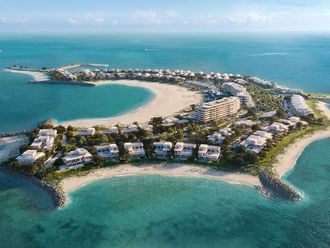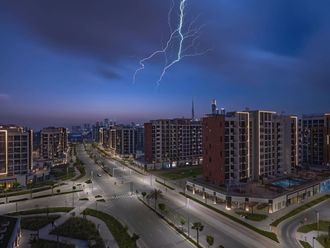Istanbul: Perched on the edge of a wasteland earmarked to become a financial district on Istanbul’s Asian side, the curved facades of five massive luxury tower blocks sparkle in the sunshine, the centrepiece of a sprawling new residential complex.
It is the sort of development that overseas property buyers in Turkey, mainly from Europe, have usually shied away from, investing instead in holiday homes along the country’s Mediterranean and Aegean coasts.
But a new wave of wealthy investors from the Middle East and Russia is increasingly eyeing luxury developments in bustling Istanbul, lured by a relaxation in property laws, relatively cheap prices and a thriving economy.
At the Varyap Meridian complex, 92 per cent of 1,200 apartments on sale have been snapped up three months before the development is fully open, 7 per cent of them by foreign buyers.
“Istanbul is becoming a second London for the Arab world,” said Erdinc Varlibas, chief executive of Varyap, the developer of Varyap Meridian.
A revision to Turkish property laws, announced in May, abolishes a reciprocity rule that only allowed investors from countries where Turkish nationals could buy real estate — such as Britain, Germany and the Netherlands — to buy property in Turkey.
The bill also allows the government to double the amount of land foreigners can buy in Turkey to 60 hectares, although for now a limit of 30 hectares remains.
Fastest growth
Turkish property prices marked the third fastest-growth in the world in the year to June, behind Brazil and Austria, surging more than 10 per cent and outpacing Russia and Hong Kong, according to the Knight Frank Global House Price Index.
Rising prices and the prospect of relaxed rules for foreigners are fuelling lofty ambitions in Turkish property circles for Istanbul to match the rapid rise of other newly fashionable property hubs such as Moscow, where prime real estate prices now rival London and New York.
Turkey’s Association of Real Estate Investment Companies (GYODER) forecasts that property sales to foreigners could nearly double to $4 billion (Dh14.6 billion) in 2013, from $2.5 billion last year as a result of the changes, which will open up the market to buyers from the Gulf, Russia and Central Asia.
Annual purchases could reach $10 billion in the medium term, says the group’s chairman Isik Gokkaya, w ho is also leading calls for further tweaks to regulation to include residence permits for foreigners who buy real estate in Turkey.
Investment funds are far more cautious. While they say Turkish property is attractive, prices are rising fast, raising the risk of a bubble in the luxury sector. Rental yields on luxury flats are a modest 3-4 per cent although analysts do not expect a sharp drop in prices because low leveraging would allow owners to sit on assets if prices started to fall, limiting firesales.
The country has seen a near tripling of per capita income over the past decade, fuelling a property rally that has been supported by the introduction of mortgage financing, rapid urbanisation and demand for more luxurious, earthquake-proof homes.
In Istanbul the average asking price for a luxury apartment more than doubled to just over $4,500 per square metre at the end of 2011, from over $2,000 in 2004, according to data from property firm Colliers International Turkey.
Yet that is still relatively cheap at nearly a fifth of the average price in London or Hong Kong and Istanbul ranks a lowly 30th in the world’s most expensive cities for real estate, according to the Global Property Guide, an international property investment research website.
On a hilltop with commanding views of the Bosphorus and the city’s historic skyline, the Zorlu Centre is one of Istanbul’s most ambitious mixed-use projects combining apartments, a $300 million venue for Broadway shows and a luxury Raffles hotel.
Mehmet Even, assistant general manager of Zorlu Gayrimenkul, said the group was in talks with three international real estate funds to sell one of the complex’s three residential towers. However, with apartments selling for up to $18,000 per square metre, he acknowledges that demand from institutional investors may not be as frothy as some property consultants suggest.
“There are a lot of big development consultants or agents walking around in Turkey looking for opportunities ... they are circling around. But they are concentrated for now on buying cheap,” said Even.
“Our project isn’t suitable for that.”
Competition
While Turkey is often seen as a safe haven in the region its proximity to strife-torn Syria poses risks while global economic uncertainty is making investors wary of riskier emerging markets.
“I see some level of market demand especially because of the troubles in the Middle East, but the levels expected, I’m not sure they’re reachable,” said Kerim Cin, managing partner of Colliers International in Turkey.
“They’re still assuming market confidence is the same as before,” he said.
Turkey’s economic growth is softening: the government expects it to miss its 4 per cent growth target this year, after an 8.5 per cent expansion in 2011, and new mortgages have fallen to their lowest level since 2009, although this has done little to dampen the optimism.
BofA Merrill Lynch analysts reversed their long-held negative stance on Turkish real estate in August, saying lower interest rates and demand for new projects would help lift the sector over the next 12 months.
Cin said the change to the law would enable foreigners to mop up any oversupply at the top-end of market.
“In a certain segment of residential, the middle to high income bracket, there is an oversupply ... The capital flow is one of the solutions to getting rid of the oversupply in large cities,” he said.
Oil-rich investors from the Gulf and Russia, who already flock to seaside resorts near the city of Antalya on the Mediterranean coast, are seen as most likely to take advantage of the new law to buy property on the coast.
“The first wave will come to tourist places then they will come to the big cities ... Istanbul will be their first target,” said Kurthan Atmaca, an analyst at Ekspres Invest.
Credit status
“If we receive investment grade, I think all the big funds will also come into the residential market,” he added.
Ratings agency Fitch has signalled it will upgrade Turkey to investment grade credit status within 18 months, if Ankara makes progress on reducing its high current account deficit. That would pave the way for global insurance, pension and sovereign wealth funds, seeking alternatives to negative-yielding bonds in markets such as Germany, to invest in higher-yielding Turkish assets including property.
A rush of funds is not assured though. Swiss-based Peakside Capital, which manages two real estate funds in Turkey and Europe, sees greater investment opportunities in other markets in which it operates.
“On a relative, risk-adjusted basis, it’s not as rosy as everybody talks it up to be,” said Zeynep Fetvaci, head of business development at the investment manager, which was sold by Bank of America Merrill Lynch in 2010.
Fetvaci points to the illiquid real estate market and subsequent price gap due to the lack of large transactions, as well as the risks of investing in an emerging economy.












